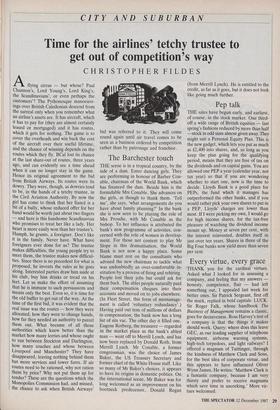CITY AND SUBURBAN
Time for the airlines' tetchy trustee to get out of competition's way
CHRISTOPHER FILDES
Aflying circus — but whose? Paul Channon's, Lord Young's, Lord King's, the Scandinavians', or even perhaps the customers'? The Pythonesque manoeuvr- ings over British Caledonian descend from the surreal only when you remember what an airline's assets are. It has aircraft, which it has to pay for (they are almost certainly leased or mortgaged) and it has routes, which it gets for nothing. The game is to cover the overheads and win back the cost of the aircraft over their useful lifetime, and the chance of winning depends on the routes which they fly. BCa1 lost its chance at the last share-out of routes, three years ago, and can evidently see a time ahead when it can no longer stay in the game. Hence its original agreement to the bid from British Airways. Its routes were its dowry. They were, though, as dowries tend to be, in the hands of a tetchy trustee, in the Civil Aviation Authority. By now the girl has come to think that her fiancé is a bit of a bully, whose reduced offer for her hand would be worth just about two fingers — and here is this handsome Scandinavian who promises to treat her like a lady. Her heart is more easily won than her trustee's. Humph, he grunts, a foreigner. Don't like it in the family. Never have. What have foreigners ever done for us? The trustee makes difficulties, the young people try to meet them, the trustee makes new difficul- ties. Since there is no precedent for what is proposed, he invents the rules as he goes along. Interested parties draw him aside at his club, buy him drinks or tread on his feet. Let us make the effort of assuming that he is immune to such persuasions and means only the best. Even so, it is time for the old buffer to get out of the way. At the time of the first bid, it was evident that the real issue was the routes — how they were allocated, how they were to change hands, how far they needed an authority to parcel them out. What became of all those authorities which knew better than the market how many lorries and whose ought to run between Stockton and Darlington, how many coaches and whose between Liverpool and Manchester? They have disappeared, leaving nothing behind them but more services and lower fares. If air routes need to be rationed, why not ration them by price? Why not put them up for tender? These are the questions which the Monopolies Commission had, and missed, the chance to ask when British Airways' bid was referred to it. They will come round again until air travel comes to be seen as a business ordered by competition rather than by patronage and franchise.


























































 Previous page
Previous page